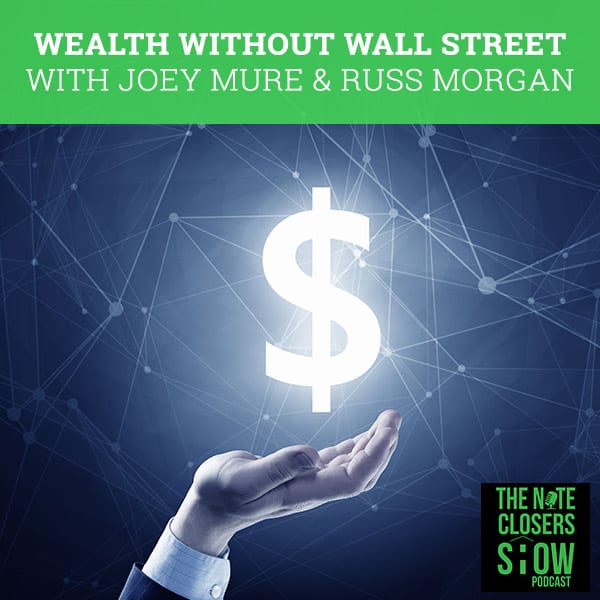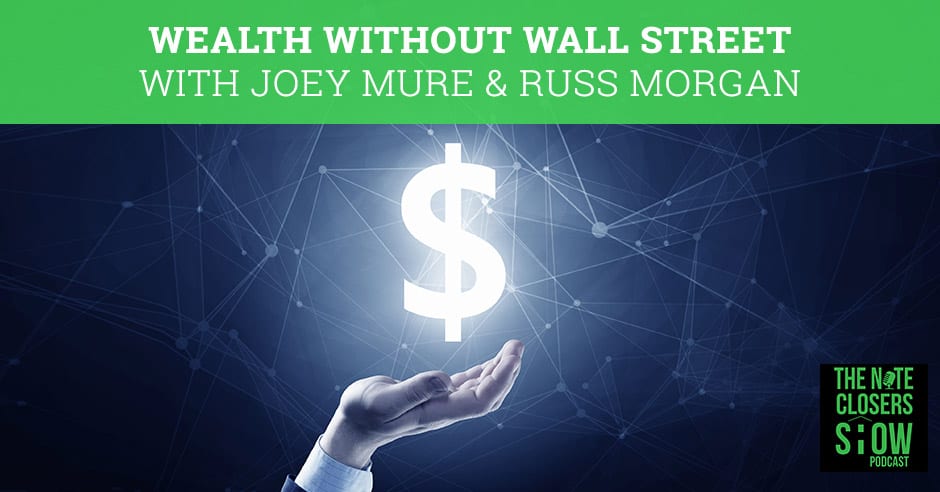
—
Listen to the podcast here
Wealth Without Wall Street with Joey Mure & Russ Morgan
We’ve got Joey Mure and Russ Morgan from the Wealth Without Wall Street Podcast that I was honored to be guest on. I love what these guys are doing. I love what they are doing. They’re going to rock your minds. What is going on fellows? How are you doing?
Thanks for having us on.
I’m excited to have you on here. Why don’t you introduce yourselves to Note Nation? Russ, why don’t we start first with you?
I appreciate you letting me go in first because I usually try to dominate the conversation in our podcast. It’s awesome to be on here to share some insight on what’s happening outside of Wall Street. That’s what you do on a daily basis as well. Our group is based out of Birmingham. We have a podcast called Wealth Without Wall Street. I’m looking forward to sharing.
Joey, tell us a little bit about you?
I love the idea of what you’re doing with note investing because my background is in the mortgage. I have seen the game from the bank’s perspective and I’ll tell you to be in their seat, that’s where you want to be. I’m excited that we can share some different practical ways that people can take that seat back from the bank and get all the profits.
You are doing something creative investing out there. You are helping a lot of your clients to take advantage of stuff. Joey, talk a little bit what your focus is and how you’re helping your clients out. If you’re an investor reading, these guys are going to blow your minds.
The easiest way to intro Wealth Without Wall Street, most people have this question, “What does that even mean? I’m intrigued by it. I’m not a big fan of Wall Street, but what else is there?” Those are the typical questions that were asked on a regular basis. We try to sum it up in five pillars. The first would be cashflow. You know a little bit about that in note investing. How do we maximize it? How do we have debt strategies to reduce the amount we’re paying out to other people so we can keep more of it? How do we use tax strategies under cashflow? If you’re paying $50,000, $75,000 or $100,000 in taxes, what would you do with $30,000, $40,000, $50,000 of that back in your pocket? How many more notes could you buy if you are implementing some of these tax strategies?
The second pillar would be life insurance. How we use life insurance as an asset type. The banks know all about this. We’re creating a way that we can do it at the you and me level. Infinite banking is one of the primary baselines of that using life insurance. The third would be the business. How do we use our business as a passive income asset? The fourth is real estate. It’s another pillar. Whether that’s flipping land, whether that’s apartment investing or whether that’s note investing. It’s a mutual real estate. Our fifth pillar is lending. Note investing falls into both of those. That’s why we’re passionate about what you’re doing. We’re grateful to share your message with our clients and audience as well. Those are our baseline on how we create Wealth Outside of Wall Street.
Russ, what do you want to add to that?
When you said the treadmill, we’ve talked about this on our show, it made me think of the rat race that most people are in. Kiyosaki has coined that phrase of getting outside of the rat race. That’s being on that treadmill, that hamster wheel or whatever you want to call it. The people that we’re trying to help are trying to find ways to do that. Joey labeled the five areas that we focused on, but at the end of the day, you are your best asset, your business is your best investment. If it’s note investing or running a dental business. It’s how do we maximize that, turn those things from active to passive so that way you can go enjoy Mai Tais on the beach or enjoy playing with kids and not having to go to work if you don’t want to. That’s what our objective is and partnering with guys like you who are already providing outside tools is a huge benefit for our clients for sure.
You are no longer trading time for money. That’s the constant theme we hear from people. They want a way out, to stop consistently having to trade their time for money.
That’s the truth. You don’t want to exchange one job for another job. That’s what we see a lot of entrepreneurs are doing is they love the idea of calling their own game, but once they get into it, they’re not prepared. They have that same mindset, “If I work 80 hours, I’ll make $200,000.” You can work less and using some creative strategies out there. How would you identify yourself? Are you wealth managers or wealth creators?
That’s always the part that people are always like, “What are you? A financial advisor or a financial planner?” Joey and I see those as bad words. Those are the words that we try to avoid. For the average person, they say, “You deal with finance, so you’re a financial advisor.” My background is coming from financial advisory roles. I was an investment manager for a long time, a certified financial planner. I have all of that in our background, but I’ve tried my best to unlearn as much of that garbage as possible. We would refer to ourselves more as coaches. I know you’re a big football guy. We always would say you’re the quarterback, we’re the coach. Whether its strategists, coach or consultant, something like that is what we tend to fall into.
At the end of the day, we don’t want anybody that comes to us and says, “Would you be my money babysitter?” We tend to frown on that. We don’t want to be a manager of your money. We want to empower you to take control of it and get out of the Wall Street mindset. The Wall Street mindset tells you, “Give me your money because I’m smarter than you. You take all the risk, but I’ll get paid in the meantime.”

Wealth Without Wall Street: You are your best asset and your business is your best investment.
I’m a return and burn commission basically and go from there.
You came from that background too when we talked. You were working in an investment advisory role.
Before I got in the mortgage company, I was working for a couple of years for Citibank, Smith Barney and a few of their companies before I went to work for JPMorgan Chase as a banker and as a mortgage professional as well too. You’re right. You have to have people unlearn that brainwashing that they’re out there teaching the average consumer out there because that’s what it is.
You have all of these common myths that the only way to build wealth is, “I must buy mutual funds. I must buy stocks or invest my 401(k),” and they start finding, “There’s this real estate thing and there are ten different ways I could do real estate, note investing.” How do I do that and create income streams, but once they do a deal with you and they realize, “That returned a significant IRR on my cash and maybe not even my cash but somebody else’s. Why would I ever take a dollar and go put it over here with this guy that I can’t touch for 30 years and hope that I get 6% to 10% back?”
You look at what the market’s doing. For example Bitcoin, “I’m going to be a Bitcoin millionaire. I’m going to take a line of credit out on my home.”
Bitcoin is making a run. It’s up almost 10% but they’re still down 85% of the year.
It sounds like a Lyft stock doesn’t it?
It’s like driving one foot on the brake and gas at the same time.
As financial coaches, do you want to talk a little bit about the process of how you’re helping? Are you working with people there in your neck of the woods? Are you working with people all across the country? What’s the makeup?
Our podcast is heard nationwide. We do business with people in almost every state there is out there. It’s funny that whenever you’re on mediums like we are, you can talk to people in a seat across the country where we sit here in Birmingham and 95% of our meetings happen online. It’s seeking people who have those similar values, who are looking to get out of the rat race, who are challenged and don’t feel like they don’t want to invest in their business. They want to invest in ones that they own and control. We take a process as Joey laid out a little bit. It’s a go of how do we seek out things that have been around forever, businesses, real estate, lending, life Insurance and focusing on cashflow as a cool way to do it.
Do you mind explaining what infinite banking is? It’s like, “I’ve heard it. People heard of that.” They don’t know exactly the concept of it.
Infinite banking at the base level is putting money in a place that will allow it to have uninterrupted compounding interest. That’s something that everybody would agree that they would love to have. If I said, “Every dollar that you’ve made if it continued to compound for the rest of your life, that’s an incredible number.” I would say it starts with savings. Infinite banking is not comparing an investment with a savings vehicle. It’s a savings vehicle with a savings vehicle. I’m going to use an example of I want to invest in a note. Let’s have stacked up $100,000 and I want to get started. If that $100,000 could be earning 4% over a 30-year span of time, it’s seven times multiple. That $100,000 if it could continue to grow, it’s worth $700,000.
By using life insurance in place of a savings account, I can continue to earn that money because the money continues to compound in the insurance contract uninterrupted. Even though I’ve used it to buy a note at the same time. If I compare that with the savings account, I’ve built up that money and $100,000 and then I trade it for the note. That’s still a good transaction. I got $100,000 earning nothing or I can use it in this note and create passive income. That’s fantastic but what’s even better is if I can get both at the same time. That’s at the very baseline what we’re accomplishing with infinite banking.
We get that question all the time of what is infinite banking. If somebody has read a book called Becoming Your Own Banker. Sometimes we get confused with another group out there. They advertise on the radio with a similar name, but not nearly as cool and they ask that question, “What is this whole concept about?” At the end of the day, it’s using the money to do two different jobs. If you’re a business owner, you don’t want the employee doing just one job, you want them doing as many jobs as possible. Most people will have their money only doing one job. They got to save for retirement. They got it to buy real estate. They got it on helping their employee benefits. Joey and I are always looking for efficiencies.
It seems crazy to think that 1% or 2% and it makes a difference, but it really does. If we think about the amount of time that we have money sitting idle, whether it’s until we find an opportunity or when that cashflow is coming back for us and we’re still waiting for the next opportunity. What is it that we could be doing with that cashflow? Instead of putting it at risk, how do we keep it protected from creditors, from taxes? We found one of the oldest most boring tools out there and found a strategy to make it cool and to help our investors do more with a dollar than having it do one job at a time.

Wealth Without Wall Street: Wealth is about finding ways to protect money, transfer it, and grow it.
That’s smart on that aspect of being able to use leverage and some other things to make that happen.
Scott, one thing we’ve talked about before is sometimes it’s hard to visualize what’s going on within an insurance contract and it helps to run your own scenario and to be able to apply it to yourself. One thing from an analogy, everybody nowadays has a rewards credit card. They’ve got money. They could be spending directly for whatever their purchasing, but what they’ve chosen to do is to run it through the means of this rewards credit card. Why? It’s because there are these added benefits. There’s something that they get for nothing. When you think about life insurance designed properly, this is a professionally designed contract that is for cash value first and death benefits second. When it’s done properly, you’re getting the added benefit of tax-free income in the future and a death benefit now and in the future that also passes tax-free. Those are way bigger than the 3% cash back or 5% cashback on your Discover card. I hope that’s helpful as far as an analogy.
It also makes sense in twos versus an estate tax. If somebody passes away and you’ve got all this cash than paying the taxes on that you leave that to your loved one versus the insurance. It’s a big difference. It gets taxed when somebody passes away.
There are lots of tax benefits. That’s what wealth is all about. It’s trying to find ways to protect money, transfer it and grow it. The less somebody else’s hands put on it, the better.
What are some of the biggest mistakes you see some of your clients have made before they start getting coached up by you? What’s the biggest myth that you see that people are running with and it’s ill-knowledge? Anything that’s hot buttons for you?
There are a lot. I will say if I kept a specific area that we’re in because there are a lot of people that have heard a little bit about this. Maybe they go reach out to a friend who happens to sell life insurance. They read a book or they watch a video that maybe they can help them and they will ultimately have a tool, but the tool is not set up correctly, but more importantly, don’t have the process. What’s the old redneck saying, “By holding the pole is fishing.” That’s what is happening a lot out there that people are not necessarily able to teach them the process because it’s about velocity. We followed this concept of becoming your own banker. If you think about a way bank works, when you put a dollar in a bank, is that liability or an asset for the bank?
It’s an asset for them for the most part.
Unfortunately, it’s not. It’s a liability. It’s because they owe that money back and you inherently know that because you’re on the other side of the note part. The way that they make it an asset is what do they do? They have to lend it. That’s a trick question. Don’t feel bad. 99.99% of everybody who’s not an accountant at a bank gets that one wrong, is because that’s the way our brain is taught to think. We think we put money in the bank, it’s an asset for us. It’s a liability for them because they owe it back. In order for them to turn that into an asset, they must lend it.
That’s why they’re glad to give you a return of 0.1% when they go out and charge 18% on credit cards.
Here’s even a more important point than that. I’m going to use Bank of America’s stats. They go out and they give you 0.1% on your money and they go and lend it at 5.1%. What’s the return for Bank of America? It’s 2,600%. You knew that math because you knew when you borrow money and you go put it at work, it’s not the spread between the difference because that’s not your money. That’s the way banks work. They work on velocity. They think in terms of using leverage in order to do it. Sure, they’d love to charge you 18%, but more importantly they want to do it as many times as they can. When we look at what people do with money, one of the biggest mistakes people make is that they may buy this great tool. They got a Ferrari, but they drive it like a Yugo. They don’t have anybody who can teach them how to use it. They’re not figuring out velocity is what’s most important. They get caught up in interest rates and that’s a huge problem I see.
Everybody loves to brag about their interest rate on a mortgage. It’s like a negative Am or a pick-a-pay loan. It’s not something you should be bragging about. You’re losing interest every month.
You’re bringing up a blast from the past there with the pick-a-pay and the negative Am. Those are some oldies but goodies.
They are starting to reappear. Somebody else sent me a pricing guide because I’ll have a couple of mortgage bankers that I work with that reach out to me. Subprime has already been back. They got creative. They call it Non-Prime. ARMs are back, 5/1s, everyone ARMs are back and they’re starting to get creative. People in California can’t afford the dirt that they’re living on so they want to try to finance that stuff. When I was a mortgage banker, I was a mortgage coach. There are products that are good for some people, but for the majority of people, they need to stay away from some of those crazier products if they’re not going to do it and run with it long-term. I’m sure you are advising people in and out of things like, “What are you thinking here? This doesn’t make sense for what you want to accomplish.”
It’s a tool. All of these financial instruments are tools. Sometimes people will say, “I’ve heard about whole life insurance.” Why would you use this tool? How would you use whole life? Why would you not use something that could go a lot faster? When you were in the mortgage industry like interest-only notes and negative Am, they were tools. “Were there people that used those and made lots of money doing it?” “Absolutely.” Were there people that lost their shirts? They were buying way too much house and all of that. They are tools. I was watching a video. There was a golfer that holds it from the water. He was sitting off the green, hitting the ball off the drive, went in there and took his shirt off. He knocks it in and hits an eagle on par-four. I watched Joey try that same thing for about ten shots. It didn’t work out, so it’s not the golf club. It’s the user of that tool that makes that shot work out.
You have been doing this for a while. This stuff isn’t the flavor of the month. The stuff that you are working through, the stuff that’s been around for quite a while though.
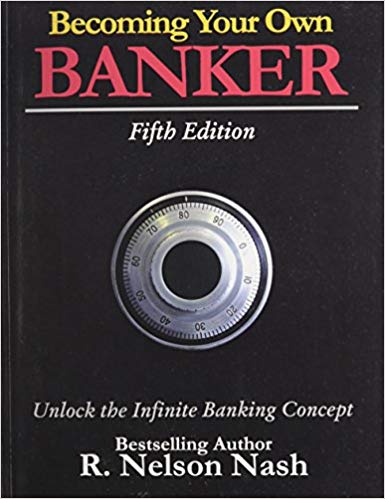
Becoming Your Own Banker: Unlock the Infinite Banking Concept
The process of infinite banking has existed for a long time. This goes to one of the biggest objections we hear, “Why aren’t more people doing this? It sounds too good to be true.” The issue is that Nelson Nash, the guy that discovered this in the ‘80s personally, he was upside down in real estate debt and trying to find a way out and realized he had cash in these policies that he could leverage to pay off these real estate debts. It started out of desperation for him. He starts going around and teaching this. He’s the solo guy for a long time and he wrote the book in 2000. It’s called Becoming Your Own Banker. It’s been around for many years. This is still on the front edge, on the cusp of people learning that it exists. Honestly, it’s unlearning the financial entertainers that throw the baby out with the bathwater and say, “Life insurance is the worst investment of all time.” If we’re talking about savings, there’s no comparison. If we’re talking about investments, sure you could try to hold something else up to it, but that’s not the point. That’s not even a comparison one. It’s been around for a long time but if you haven’t heard of it, it’s not uncommon because there’s a small army of us out there teaching this and it’s growing, but it’s definitely on the front desk.
My background is I got in the financial industry in ’04. I had heard about this in ’04, but I didn’t pick up on it for a while because I was still a financial expert. That rising market made me the smart guy in the industry and it took that rising market to turn around to make me a dummy very quickly and return to reality. Since ’09 is when we picked this up and become what we focused on. Joey and I had been doing this several years personally. Joey was in the mortgage industry for a long time. Once he realized that he needed to start helping people get out of debt instead of putting them in debt, he moved over to the different side of the table and started helping me do it.
Just like you, Scott, you said, “Forget working for the bank. I want to be the bank.”
You got your policies, you’re working through that, you’re able to borrow against those policies to go out and use that money without losing your death benefit and using that money to be able to go out and leverage it with other things. It’s the basics.
The basics are if you want to say, “How does this work?” I have this whole life insurance contract. I’ve built up cash values. Sometimes people are like, “I’ve had one of those since I was a kid. What can I do? It’s got $6,000 in it.” It’s always going back to what you put in, it’s what you’re going to get out. We’ve got clients putting in hundreds of thousands of dollars in these things every single year. Joey and I use these personally. I have seventeen of these policies. The goal is to have it as a place that you put your cashflow. Once my cash is there when I find a deal. I’m sitting down and you show me how to go buy a note and take money from somewhere. I borrow money against the insurance company’s cash and I go use that in order to go buy the note. If I can get it performing and I get that cashflow coming back to me, all I’m going to do is use that cash to reduce the lien that the insurance company put against my cash value.
The goal is I don’t want ever to stop compounding interest on my money. I want to make sure that money’s growing 3%, 4%, 5% over the long call, but if I can borrow against it from time to time, replenish it as cashflow comes in, now I’m getting the best of both worlds. I’ve got one asset over here, this note. My accountant tells me that I can write off some of the interests the insurance company charged me as investment interest expense. I got some benefit there. I got two assets at work. I’m trying to do this as much as I can and sometimes people say, “Russ, when you got seventeen insurance policies, can you figure that out the first time and got a big one.” Yes, if I would have been smarter. My Auburn education permits me from doing that.
The objective is how do we make that money do a couple of different jobs? If the insurance company is lending me money against mine, I got it out there at work. There are a lot of little moving parts. We’ve got some things we’ll share. Joey did a great series on this. You want to go check that out. It’s PassiveIncome.WealthWithoutWallStreet.com. You can see him using these multiple different ways. One is buying real estate and you can see how that process works. It’s nothing magical. It’s not that fancy. It’s something that’s been around for many years, but it hasn’t been very publicized.
It’s four short videos. It’s about 25 minutes in total. One of the things it will not answer and I want to throw this in and one of the objections as well. It takes me too long to build cash in these things. How long will it take? I was speaking with a client. He actively does a lot of real estate investing. He’s going to be able to put in $220,000 in the first year and $195,000 of it is available right away. We’re not talking about it taking a few years for him to get his money back or several years like you probably have heard in the past many years. He’s immediately within 30 days going to be accessing it for the next real estate deal. This is the design of it, how we put it together for you. It’s all based on your needs and your use of the money.
Is he taking that money after tax is already paid and dumping it in there?
That’s right.
You can’t use self-directed IRA funds. I don’t think you can use that to invest in that at all. Cash and income, stuff like that can go on to purchase these assets.
Yeah. Do we have people who have cashed out IRAs whether they’re post 59-and-a-half and even some pre-59-and-a-half? I sat down with a girl that took a job right out of college. She did a great job putting a bunch of money away and she wants to go back and be a doctor. She didn’t like the degree that she was pursuing and wanted to add to it. For the next 24 months, she’s going to have zero income. Her parents had been doing. They bought all sort of policies on her and the siblings and themselves have been using this within the family, buying businesses, taking over debts and other things and she’s like, “I want to do that.”
We looked at it and said, “If you do this, your income is at 12%. In that lowest bracket, you’re going to pay any dollar up to $77,000 at 12% and the government is going to hit you over the head with another 10% penalty if you take it out.” She’s like, “As soon as I get out of school in a couple of years, at a minimum, my income is going to put me in the 22% to 24% bracket.” She knows it’s ratcheting up from there. She was like, “Wouldn’t that be a penalty if I didn’t do it now?” Not everybody should do that for sure and I’m not an advocate of using IRA money to fund these. There are a lot of people out there that think maybe putting money into qualified assets is a good idea. When we point to the twenty-something trillion dollars in debt our government sits in now we go, “Are we going to be in a lower rate when we get out to retirement or are we going to be at a higher rate?” It’s not because of how much money we’re going to spend or not spend. It’s how much money is our government spending and they’re going to have to tax it. From that standpoint, we’re big fans of paying the tax now and not having to pay it down the road.
If you grow your income and grow your wealth, taking the hit now makes a lot more sense than it does in the long-term.
Most people don’t know and I didn’t even mention this. Sometimes I assume it because I do it all the time. These insurance contracts, we access the money income tax-free. There’s a huge win there. Whether it’s in the form of taking out what we’ve put in or taken it out into a form of a loan, which is not taxable. We are able to use these tax benefits in our favor down the road when we’ve tried to create passive income streams from the insurance contract, for instance.

Wealth Without Wall Street: We are able to use tax benefits in our favor down the road when we try to create passive income streams just from an insurance contract.
In light of that, I’ll share this. I was speaking with a couple. We added up what they’re going to put into a contract over the next many years. It was about $350,000 steadily over the course of the next many years. We said, “If you start taking the income out tax-free over the next twenty years after that, they’re going to pull out $880,000 over that timeframe. The input is $350,000, the output is $880,000 and there’s still almost $500,000 of tax-free death benefit that they’ll leave to the next generation. That is power. That’s quantifying that rewards credit card that we’re able to utilize the policy for it. Not to mention the $350,000 as it’s been growing the whole time, as they have been putting money in, they could be leveraging for billing other passive income streams like note investing, real estate or their business. They happened to own a travel agency and they’re like, “It’s growing fast. We got to put more money into it.” This is their capital fund. They can do both.
What’s the process if you’re sitting down with somebody? Is someone going to open the Kimono for you?
We tell them, “If this is something you’re interested in, we have a website, it’s FreeCall.WealthWithoutWallStreet.com. We take fifteen minutes and we ask them like, “What are your goals? How close are you to getting there? What’s going to keep you from getting there? What happens if you don’t?” It’s a fifteen-minute call that we do with every single person that comes to us off our website, YouTube, podcast or whatever it is. In that timeframe, it’s finding out the basics. At the end of the day, I don’t want to know what’s underneath the Kimono. If your goals and my ability to help you achieve those goals are way off. You remember when you first started with Smith Barney and when I started this business in ’04, if somebody could fog a mirror, this is the best person for me to be talking to.
At this point, who is trying actively to get out of the rat race and is at a point in life where this is now moved from not important but to urgent. If we can help them step on the gas to get there, that’s the person we’re looking for. It’s not necessarily how much money. A guy called me, “I got a referral for you.” They only have about $500,000 in assets and they’re doing this and that. I don’t go by that because the reality is that maybe $500,000 could be a lot or it could be a little. What are they trying to accomplish and where are we at? Joey and I are not trying to be financial planners. I have no interest in managing somebody’s money. Our goal is can we help you get closer to financial independence. As Kiyosaki uses that wording, we use that same formula. Do we have more passive income than we have monthly expenses? We’re trying to find ways to partner with guys like you that can help us create those passive income streams and we’re using cash values to do it.
Scott, once we have a fifteen-minute call and we have both agreed that this is going to be a good fit, we move into a 60-minute webinar style meeting where we then answer all the questions. People have been listening to our podcast, they’re like, “I get this infinite banking thing, but help me understand this. How do loans work?” Those are a number of frequently asked questions. We spend that 60 minutes outlining those things, making sure those things make sense. Our third meeting is all about application. How do we apply this concept to your situation? We are using your numbers. Then and only then are we even asking about any numbers, because we don’t care until it applies to you. From there, if it’s a fit, we then move forward from there applying with insurance companies and so on. That’s the baseline. If you start with savings, you got to get a better savings vehicle than your savings account. From there, we can invest in the things that we know and understand. In your case, that’s note investing that they’ve been educated properly and they know what they’re doing.
Is there a follow-up for everybody once a month, once a quarter, once a year as they’re making changes or they’re looking through things? How’s that work?
That’s one of the things I feel we’ve tried to work on. I won’t say that we hit the nail on the head when we first started doing this. We thought, “We teach you. You read these books. You watch these videos. We meet five, six times early on and pat them on the back, off to the races and go get another one.” That’s the way we did it for a long time and we realized that was a failure. When we meet people who have been out there who may be heard about this before, a lot of them have that experience. They may be bought a policy. Maybe it was a good one and maybe they were taught early on some things, but they haven’t had any support thereafter.
What we’ve made some serious changes is building a community to help support these guys. I know that you have a community that helps support note investors. We’ve built that same thing with our infinite banking people. We call it The Wealth Counsel. It’s a private group for our clients. It gives them access to other people all across the country who are doing this. It gives them access to other specialists, whether they’re tax people, real estate people or note people. It’s amazing how many people in this group have all these different expertise and they can come in and ask questions. Joey and I get to chime in and help.
We’ve also built an internal coaching program that allows them to be coached as they are growing through this process. Not just the old insurance way where somebody buys an insurance policy and call them once a year and say, “By the way, do you need any more?” That’s not the model that we’re working on. It’s constantly trying to improve it and grow. As you have needs, that’s when we need to be talking. We need to treat your advisor. We’re abundant in this so we want to give your community as many helpful tips. If you’re learning about this and you got a local person in your area and you’d rather use them than us, that’s awesome as long as they know it. We are all in support of that. One of the things is definitely having the ability to grow with that person. Making sure that you’re going to have somebody that’s going to help you along the way and it’s not going to be when a year goes by I get a call and asked, “Can I put some more in this thing?” It’s more like, “I want to call this person when I need help. How do I use this to go buy more notes and more real estate or invest in my business?” That person is built in a way to help them do that.
It’s not just us as coaches, it’s we. It’s our students, it’s our clients. We are helping everybody grow. It’s the big thing because they hear stuff from me but it’s also nice to hear that from other people. They see other success stories. You and I can talk all day. It’s when that individual client stuff and say, “I did this or I was able to do this from what Russ and Joey taught me,” and take that to the next level. It’s a lot more comfort level because they’re just not hearing the Pied Pipers singing, so everybody behind is singing to the same tune as well.
They go out, try something and they get whacked. Eventually, they put their head back inside the shell. They don’t want to go out, but if they have a place that they can communicate with other people trying to accomplish the same goals. Here’s the thing, and you know this. How many of your people learned about note investing and went out and told two friends about it. Those five friends have never done note investing and don’t know anything about it. They go, “That’s stupid. Why are you doing that?” They’re like, “Is it stupid? Is this a bad thing for me to do?” They start questioning it, but if they have a community to come back to and say, “I went out on a tribe. I talked to these people” They got 500 people to chime in and say, ”I went out and said to my friends and they said this, but then I went back and I told them this” They have some confidence. They feel support. That’s one of the things that sometimes it’s positive but sometimes it’s negative. As human beings, we have this intuitive nature to want to be in a tribe. Sometimes we end up joining up with the wrong people. People that don’t want to be out of the rat race, who are satisfied with their W-2 jobs and working 8 to 5. I remember when we were talking, you shared some of those analogies and that’s not what most of us want, so we need to find other people who are similar in nature.
People will go out and ask for the advice of their friends and family when their friends and family have no bearing and have no knowledge of it. What I do is I go out and seek council from those that are doing what you are trying to get to. As a note investor, I didn’t go ask my realtor who has never done it. I went and talked to the guy that closed a thousand deals and learned from him. When I wanted to learn more about buying the distressed debt, I went out and talked to the people that we’re dealing with that aspect. You’ve got to seek counsel from people that’s been there before or who are doing it. Not somebody who’s sitting on the sidelines watching the NCAA tournament in their underwear and not doing anything at all.
I had a student one time. A student came to the class and loved it. A couple of days later, I ended up going to the restaurant and he was there with his wife. He sat down and he hadn’t shared much of what was going on. We got to talking. She stood up and pointed at me, “You’re the devil.” I’m like, “What are you talking about?” I’m like, “I don’t know what he told you or what you’re thinking, but I am not like that at all.” You got to realize that there are a lot of misconceived notions, myths out there in the finance industry that people think they know, but they haven’t sat down and talked to the experts to do it. I encourage anybody, take the time and schedule a call at FreeCall.WealthWithoutWallStreet.com.
If you’ve already thought about this and said, “I’ve been looking for the right people to partner with.” Maybe you’d see if these guys are a good fit. There is no obligation and no cost. That’s how you get to our calendar. We have other advisors we’re adding all the time, so it’s going to be on our team that you’ll talk to. That’s how you get the fifteen-minute call.
One of the things we love about is what you’re doing. This is one of the passions we have. We started the podcast with the objective of having a weekly conversation with our clients. It never was intended to reach 65 countries and 50 states and everything that’s happening on a monthly basis, which is always surprising like, “What’s that guy in Sri Lanka thinking of my accident?” or “Why is the person in Nairobi listening to the Wealth Without Wall Street Show,” but they are and I’m thankful. Thank you for listening.

Wealth Without Wall Street: As human beings, we have this intuitive nature to want to be in a tribe.
I used to get those letters from the princes over there, but they quit asking me to help them with their accounts. I don’t know what happened. Go to WealthWithoutWallStreet.com or go to iTunes or wherever you’re listening to podcasts and pick the one with the coolest logo. There was a guy that started a podcast Wealth Without Wall Street and did three episodes. You’ll quickly notice that that’s not ours because the logo’s not nearly as cool. Pick the one with the faceless man and it is a profile of myself, not Joey. We get on there and we beat each other up like this. We talk about not only business subjects, real estate subjects, life insurance subjects and ways that we can improve and create passive income. I appreciate you having us on the show.
It’s definitely a fun thing and sharing knowledge and nuggets. This is not meant to be an educational aspect of it, but it’s an opportunity for you that is reading this to go check it out, learn some stuff. That’s one of the biggest things that separate the wealthy from those that are struggling and buys knowledge. A few years from now, the only thing that will be different about you are the books that you read and the people that you meet. Read a couple of books, Becoming Your Own Banker is the book that Joey said, or reach out to these guys and learn some stuff. That’s what you want. It’s all about building relationships and leveraging relationships to help you get to where you want to be.
I am not the note guy because I knew everything as a note investor. I didn’t know it’s all about leveraging relationships and helping me get to the next place. That’s why I love having you on here because you’ve dropped some great knowledge bombs, some nuggets for people to take a look at. We’ve got an educated crowd that follows us for the most part. I guarantee not many of them know all the ins and outs about finances and that’s why I would love to have you on. Because it’s a nugget when it helps people build their wealth so they can do more things without having to say no and they can say yes to more projects and they know how to structure it properly from the get-go.
We appreciate you. Continue teaching people and feeding people. This is what it’s all about. Abundance is in information and networks. You can never have too much knowledge. Once somebody feels they’ve arrived in knowledge, it’s when they become the dumbest person in the room.
The best website for them to reach out to you is WealthWithoutWallStreet.com, is that correct?
Yeah. You can access the Passive Income series there. You can check our podcasts out or you can schedule a free call right there.
The email is JoeyAndRuss@WealthWithoutWallStreet.com. Thanks so much. You be safe.
Thank you.
Check them out at WealthWithoutWallStreet.com, the podcast or the website and take them up on their opportunity for a free consultation to see where you’re at, where you want to go and see if these guys can help coach you along. Go out and make something happen and we’ll see you at the top.
Important Links
- Wealth Without Wall Street Podcast
- Guest – Wealth Without Wall Street episode with Scott Carson
- Becoming Your Own Banker
- Nelson Nash
- The Wealth Counsel – Private Facebook Group for Clients
- PassiveIncome.WealthWithoutWallStreet.com
- FreeCall.WealthWithoutWallStreet.com
- YouTube – Wealth Without Wall Street channel
- iTunes – Wealth Without Wall Street podcast
- JoeyAndRuss@WealthWithoutWallStreet.com
- http://www.WealthWithoutWallStreet.com/
About Joey Mure
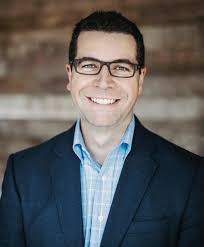 After over a decade of helping my clients fulfill their dreams of owning a first or second home in the mortgage industry, I found myself wanting to continue to impact the professionals in this field.
After over a decade of helping my clients fulfill their dreams of owning a first or second home in the mortgage industry, I found myself wanting to continue to impact the professionals in this field.
At Wealth Without Wall Street, we seek to serve as the standard in financial coaching for real estate professionals all over the nation. Traditional financial planning models limit the contributions, access, and efficiency of your hard earned money. We understand fluctuating incomes and uncertain annual (or quarterly) tax bills. Whether you are a successful real estate agent, a builder or a mortgage professional we specialize in catering plans to help you to succeed financially.
Wealth Without Wall Street was created for the real estate agent, home builder, & primary mortgage lender. At Wealth Without Wall Street we work with these real estate professionals to provide them with a future of how to save for all of life’s expenses without giving up retirement savings.
About Russ Morgan
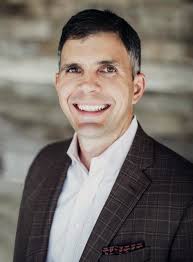 Most people struggle to find financial independence. They follow typical financial advice that doesn’t get them any closer to their real objective, Freedom. Work harder, work longer, take more risk are the motto’s they hear but it flies in the face of what people with financial freedom actually do.
Most people struggle to find financial independence. They follow typical financial advice that doesn’t get them any closer to their real objective, Freedom. Work harder, work longer, take more risk are the motto’s they hear but it flies in the face of what people with financial freedom actually do.
At Wealth Without Wall Street, we cut out all the noise and we go straight the objective.
Listen to our 5 Pillars of Wealth Without Wall Street Podcast below to get the game plan.

